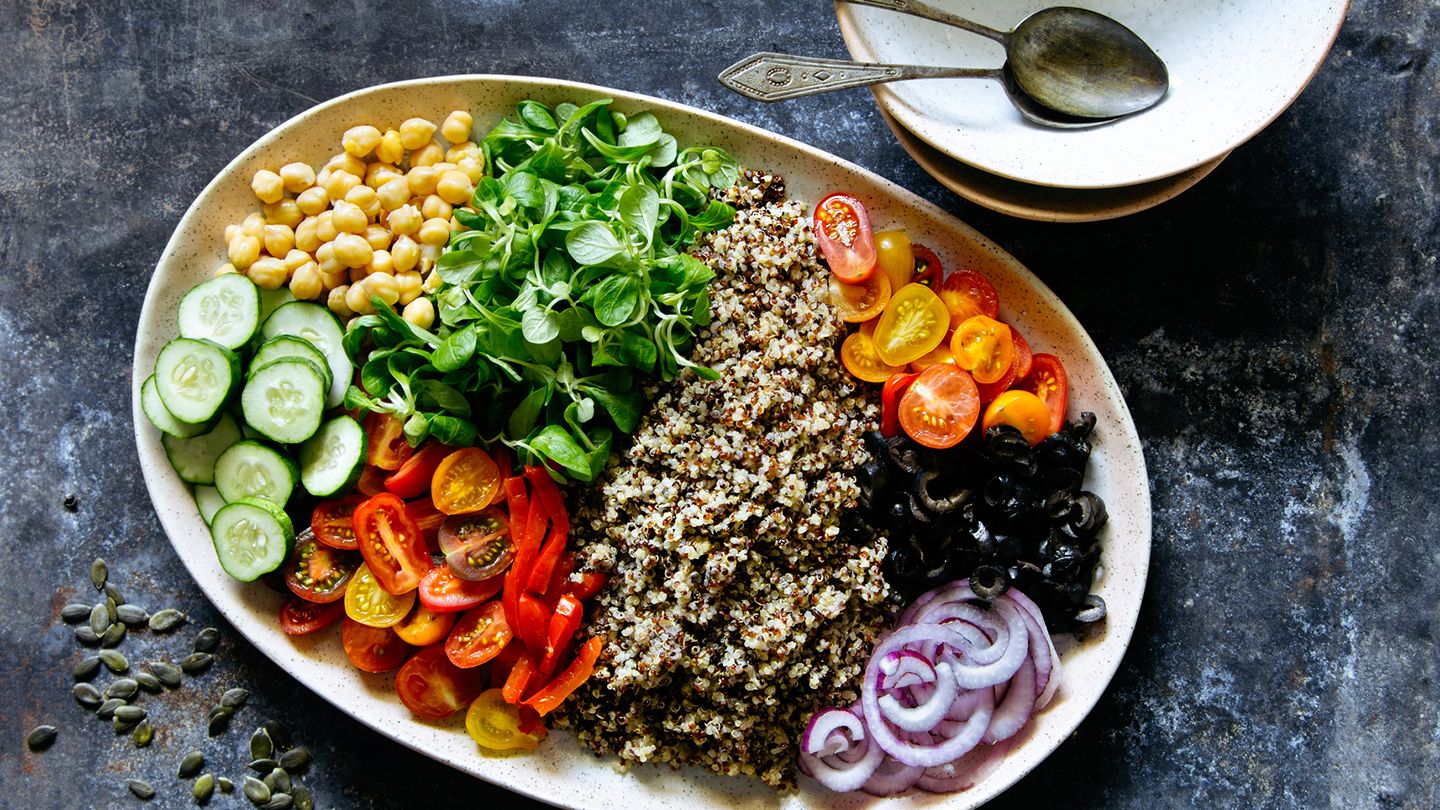Mediterranean Diet Recipes For Heart Health
The Mediterranean diet offers a delectable pathway to improved health. It emphasizes whole, healthy foods and limits highly processed ones that tend to be higher in salt, saturated fat and added sugar.
This weeknight dinner recipe is brimming with Mediterranean goodness, including shrimp, low-calorie veggies and antioxidant-rich tomatoes. It also includes heart-healthy olive oil and plant chemicals called glucosinolates from cruciferous vegetables that may help prevent chronic disease.
Introduction to the Mediterranean Diet
A “diet” can often be a scary word, implying extreme restrictions or endless counting of calories. The Mediterranean Diet isn’t one of those diets, and in fact, it has been shown to help reduce risk factors for heart disease like high blood pressure, cholesterol, and obesity.
The Mediterranean Diet focuses on whole healthy foods, with generous portions of vegetables and fruits, whole grains, nuts, and legumes; moderate amounts of seafood, olive oil, and wine; and infrequent servings of red meat, processed meats, and sugary desserts. It also encourages physical activity, and socializing with friends over a leisurely meal.
A review of over 30,000 people found that those who follow a Mediterranean diet are at lower risk for heart disease and other chronic health conditions. This may be because the diet is rich in healthy fats from olive oil, nuts and seeds? promotes regular exercise; and limits red meat and processed food. It also encourages consuming moderate amounts of alcohol, but it’s important to talk to your doctor before drinking if you have certain health conditions.
Key Principles of the Mediterranean Diet
The foundation of a Mediterranean diet is nutrient-rich plants, healthy fats (such as olive oil and nuts) and lean proteins, such as fish or poultry. You’ll also find a good dose of whole grains, and herbs, spices and flavorful vegetables. This heart-healthy eating plan limits saturated and trans fats, which can raise LDL cholesterol and lead to clogged arteries.
Instead, the diet emphasizes more fruits and veggies, whole grains, legumes, healthy plant-based oils, fatty fish and moderate amounts of red wine and dairy. It also limits refined sugar and eats fewer processed foods.
If you want to try a Mediterranean-inspired diet, start by incorporating these key principles into your meals and snacks. For example, use a drizzle of olive oil to dress salads and make quick bread dips. Replace butter with olive oil or a heart-healthy spread like hummus or babaganoosh. Choose low-fat cheeses, such as feta and halloumi, when cravings strike. And swap calorie-laden drinks for a glass of wine with dinner, which is often eaten leisurely and socially in Mediterranean cultures.
Breakfast Recipes
The Mediterranean diet offers a perfect balance of plants, whole grains and healthy fats for a heart-healthy meal. Try this sunny-side-up eggs on garlicky greens recipe to start your day off right. This easy casserole is layered with earthy cooked mushrooms and baby spinach, fluffy eggs and nutty cave-aged Gruyere for an omelet-like breakfast that’s great for lunch or dinner.
Beans, lentils and chickpeas are staples of the Mediterranean diet, so you’ll want to make this savory grain bowl a regular in your rotation. Topped with Kalamata olives, avocado and feta cheese for an added dose of heart-healthy fats, this is a filling dinner that’s also packed with vegetables.
This shrimp and okra dish is the kind of comfort food that can feel indulgent, but it’s packed with Mediterranean diet ingredients like tomatoes, basil and peppers, plus lean protein from shrimp (which is high in heart-healthy omega-3 fats) and low – okra calories. Plus, it’s made on a sheet pan for an easier weeknight dinner.
Lunch Recipes
Aim for heart-healthy ingredients like leafy greens, fish, fruit, whole grains and healthy oils at lunchtime with these easy Mediterranean diet recipes. Whether you’re in the mood for a salad, wrap or grain bowl, these heart-healthy meals are low in saturated fats and sodium to align with an overall healthy eating pattern.
For a quick and portable meal, try herbed chicken on a whole-wheat pita with vegetables. Aside from being high in the types of protein encouraged by the Mediterranean diet, this recipe also provides you with vitamin-packed veggies and plenty of fiber.
Give your chicken salad a Mediterranean twist with this recipe from Lubbock, Texas dietitian Kaleigh McMordie. This salad contains farro, white beans, tomatoes and basil topped with gooey baked mozzarella, and it’s packed with flavor without being too heavy or salty.
Another heart-healthy Mediterranean diet recipe is grilled mackerel with red plum compote. This dish is low in saturated fat and rich in healthy omega-3 fatty acids. Choose fresh, low-sugar fruits like red plums to keep added sugar content low.
Dinner Recipes
Imagine yourself sitting at a taverna, savoring fresh veggies, whole grains and healthy fats with a glass of wine (in moderation). That’s what it’s like to eat Mediterranean. This heart-healthy eating pattern offers flavorful recipes without calorie counting and limits ultra-processed foods, saturated and trans fats, added sugar and salt.
Whether you want to make the switch to the Mediterranean diet or are just looking for healthy dinner options, Hy-Vee Registered Dietitians have you covered. These heart-healthy Mediterranean recipes include a variety of whole grains, fruits, vegetables and lean proteins. Plus, they’re high in fiber and low in sodium, saturated and trans fats.
This dish is perfect for a busy weeknight and uses a combination of vegetables, including bell peppers and tomatoes, and protein-packed beans. You can even use canned or frozen veggies to keep this meal prep recipe quick and easy. The yogurt dressing adds a calcium and protein boost. Try this vegetarian dish with grilled chicken or fish for a meal that’s full of flavor.
Snack Ideas
Adding a Mediterranean twist to traditional snacks can help you feel full and satisfied between meals. Nuts and seeds are common Mediterranean diet staples because they provide a source of heart-healthy fats and protein, as well as nutrients like magnesium and potassium. A handful of roasted sunflower seeds or a jar of Terrasoul’s hulled sesame seeds can be satisfying between meals, especially when paired with a slice of whole grain toast and Laughing Cow cheese rounds (low in saturated fat).
Another tasty snack idea is a roasted nut parfait made from a combination of plain Greek yogurt, toasted almonds and a drizzle of honey. Be sure to use a low-fat version of the yogurt to keep saturated fat levels lower, and for Med Diet bonus points, add in a cup of berries and chopped walnuts (rich in antioxidants and fiber) to give this snack an extra boost.
If you’re looking for a heart-healthy appetizer, try a simple Mediterranean bean salad that combines lentils and chickpeas (rich in plant-based protein), tomatoes and herbs, with a zesty lemony garlic dressing. You can also turn this salad into a meal by combining it with a piece of grilled fish, such as salmon (rich in Omega-3 fatty acids), that has been brushed with olive oil and seasoned with salt and pepper.
Dessert Options
When it comes to heart-healthy eating, the Mediterranean diet is a go-to. It features plenty of nutrient-rich plants, healthy fats like olive oil and whole grains, and lean protein. Plus, it includes wine and dark chocolate—which are both good for the heart.
Sitting at a taverna in Santorini with a glass of wine and a Greek salad loaded with the freshest veggies and grilled fish might be a bit of a fantasy for now, but you can still enjoy the flavors of this healthy diet with these easy Mediterranean dinner recipes . They feature ingredients that are rich in heart-healthy fats, vitamins and minerals, and low in saturated fat and sodium.
This creamy recipe swaps butter for heart-healthy olive oil and adds in whole wheat flour for added fiber and a nutty flavor. The result is a sweet treat that can be eaten by the spoonful or used as a dip for slices of sturdy fruit.
Conclusion
Sitting at a taverna enjoying a glass of wine, a fresh salad with the freshest veggies and a mouth-watering piece of grilled fish while overlooking the Mediterranean Sea may sound like a dream come true. But even if you can’t afford airfare to Santorini, you can still benefit from the delicious, heart-healthy foods of the Mediterranean Diet.
The key to this diet is avoiding processed foods and instead focusing on whole healthy foods. Swapping butter for olive oil, pasta for a veggie-laden salad, and soda for water can all contribute to a healthier lifestyle.
Another important component of the Mediterranean diet is limiting red meat and instead replacing it with poultry, fish or beans. If you do eat meat, choose lean options and eat them sparingly. The Mediterranean diet also encourages moderate amounts of red wine (one glass a day for women, two for men). This drink helps protect the heart, and studies have found that it can reduce triglycerides. But be careful to avoid high-sodium drinks like cola and energy drinks .






